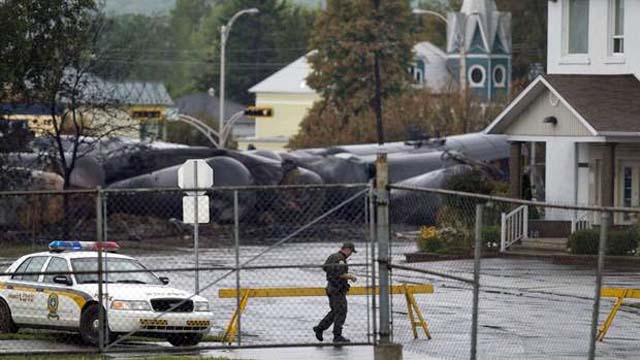

Crushed tanker cars can be seen near a residential area in Lake Megantic - 9 Jul 2013 Moe Doiron.
9 July 2013 Railway Employee Was Present at Fire Before Quebec Train Derailment Lake Megantic Quebec - The Transportation Safety Board of Canada has confirmed a railway employee was present at the scene when firefighters dealt with a locomotive blaze, just before the freight train carrying crude oil careened at high speeds into Lake Megantic and exploded.
The safety board's comments at a briefing in town Tuesday morning follow comments by the head of the company at the centre of the tragedy that suggested firefighters had shut down the locomotive, disabling its brakes, hours before it rolled out of control.
As hundreds of evacuees from the Lake Megantic rail disaster were permitted to return to their homes for good on Tuesday, investigators released new details about events leading to Saturday's fatal crash.
The Montreal Maine & Atlantic Railway train derailed early Saturday morning, causing explosions and a fire that officials say killed at least 15 people, forced the evacuation of 2,000 residents, and destroyed about 30 buildings. In addition, about 50 people remain unaccounted for.
About 60 police officers are busy in the area, recovering human remains and potential evidence as Surete du Quebec Inspector Michel Forget, confirmed late Tuesday that they have opened a criminal investigation into the disaster. He said terrorism is not being considered, but if charges do arise, they would more likely be criminal negligence.
Ed Belkaloul, TSB manager for Eastern Region Rail Operations, said the MMA train, with 72 cars carrying crude oil, was parked on the main track, and not a siding, in Nantes after it stopped around 11 p.m. Friday.
The engineer secured the train and left. Fifty minutes later, Mr. Belkaloul said, a fire was reported and an employee arrived at the scene to help the fire department. That employee was not the same person as the engineer who had driven the train to Nantes, he said. The locomotive engine was cut off around midnight.
In an interview with The Globe and Mail on Monday, MMA chairman Edward Burkhardt pointed a finger at the fire department in Nantes, saying he believes the train's air brakes were released because firefighters turned off the engine when they extinguished the fire.
"They went out there by themselves, shut the engine off, doused the fire. A very small fire," he told The Globe from Chicago.
The Nantes fire chief, Patrick Lambert, responded angrily Monday to Mr. Burkhardt's allegations and said he would "clear this all up" in the coming days.
Donald Ross, the TSB investigator in charge, said the train began rolling down around 12:56 a.m. on Saturday. It moved down a 1.2 degree (Editor: percent.) grade, which in railway terms is steep.
The runaway train rolled for up to 20 minutes, covering a distance of 9.7 kilometres, before jumping the tracks in the downtown of Lake Megantic at 1:14 a.m.
The TSB said it would look at operational procedures, including why the train was parked on the main track rather than a siding.
Mr. Belkaloul also noted the tank car models used to carry the fuel were generic tankers that could be used for any liquid load and were not double-hulled or reinforced with shields.
Investigators have recovered data recorders but can't disclose all the information because there are other parallel probes, including a police investigation.
Mr. Ross would only say that the runaway train was going at too high a speed when it hit a curve in downtown Lake Megantic and derailed.
The disaster has torn apart the long-standing relationship between Lake Megantic and MMA. Safety concerns about the railway have been mounting in the area as the Eastern Townships community had grown increasingly worried about the condition and path of a train track that wound through town.
A growing body of questions are emerging about whether the train's operator was following safety standards, and the adequacy of small town rail road systems, as they bear increasingly dangerous loads.
Mr. Burkhardt plans to visit Lake Megantic in the "next couple of days," he told CBC on Tuesday. He previously said he had received many hateful e-mails and hoped no one would shoot at him.
A partial lifting of the evacuation order returned a degree of normalcy to residents who have been living in makeshift quarters at a local school or with friends and family in the area. But many are just barely coming to terms with the tragedy.
Sitting in front of the school that had been his temporary home since Saturday, retiree Marcel Brousseau, who lives on Rue Laval, about 250 metres from the derailment, called the disaster "unacceptable."
Mr. Brousseau said he and his wife expected to return to their apartment Tuesday afternoon, after dropping in briefly the day before to pick up clothing and medication. But he and wife Mariette, sitting outside the school building that had been their home for the past three days, said they would likely instead stay with one of their sons tonight in nearby Nantes. "I don't think we will stay there, we'll wait," Mr. Brousseau said. His wife clarified it was "more for psychological reasons, because the disaster is so fresh in our heads".
"We had a very beautiful city, a beautiful park," Mr. Brousseau said. "It will take years but it will be revived." He welled up as he spoke of his former boss, local construction firm owner Raymond Lafontaine, who is believed to have lost several family members, including his son. "I cradled that boy in my arms when he was a baby," Mr. Brousseau said, his eyes welling up. "The tragedy of Lake Megantic has hit me but the tragedy of Mr. Lafontaine... " he said, trailing off.
Sean Silcoff, Tu Thanh Ha, Jill Mahoney, and Kim Mackrael.



Vancouver Island
British Columbia
Canada
|

